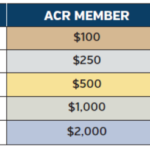 RheumPAC is the ACR’s political action committee, which works to advance solutions for challenges affecting rheumatology clinicians and professionals and their patients by educating, electing and supporting federal lawmakers. Thanks to donations to RheumPAC, the ACR has an even stronger voice in Washington, D.C., than one might expect, given the size of the rheumatology specialty.
RheumPAC is the ACR’s political action committee, which works to advance solutions for challenges affecting rheumatology clinicians and professionals and their patients by educating, electing and supporting federal lawmakers. Thanks to donations to RheumPAC, the ACR has an even stronger voice in Washington, D.C., than one might expect, given the size of the rheumatology specialty.
For the College to make an even bigger impact on Capitol Hill, RheumPAC needs to expand the number of ACR/ARP members who participate. We know that a key to recruiting new donors is educating them on the importance of RheumPAC and introducing them to the work accomplished by the advocacy team. To make this happen, we need your help because educating our members, strengthening our fundraising capabilities and sponsoring events for our members and staff to interact with lawmakers come at a cost. A 2020 study of trade association PACs showed that it costs 32 cents, on average, to raise $1. To grow RheumPAC and increase its spending power to match those of other, more influential specialties will take significant resources, which is why the RheumPAC Advocacy Fund was established.
Although RheumPAC itself can accept only personal contributions from individuals, and 100% of funds raised for RheumPAC go directly to campaigns of elected officials that merit support, professional practices and other organizations can further support RheumPAC’s work with corporate funds through the RheumPAC Advocacy Fund.
Launched in early 2019, the RheumPAC Advocacy Fund has been a great success, raising more than $100,000 since its inception. But we are quickly using these funds.
The RheumPAC Advocacy Fund provides additional resources for RheumPAC and ACR staff to expand its endeavors to reach potential donors. Funds this year have gone toward graphic design, video production, creation of donor incentives, as well as printing, mailing and postage costs for large-scale solicitation communications. Having these supplementary funds at RheumPAC’s disposal has been extraordinarily helpful, especially during the ongoing pandemic when in-person interactions to educate individuals and recruit new donors are severely restricted.
With your practice, organization or state society’s contributions to the Advocacy Fund, RheumPAC will be able to dedicate more funds to bringing on new donors and improving our fundraising capabilities. In turn, this will enable us to more effectively advocate for you and your patients’ best interests, and serve as your voice in D.C.
Is your practice or state society interested in donating to the ACR’s Advocacy Fund? Write a check to RheumPAC Advocacy Fund and mail it to:
RheumPAC
2200 Lake Boulevard NE
Atlanta, GA 30319
Why Your Colleagues Contribute to RheumPAC

Dr. Worthing
Angus Worthing, MD, FACP, FACR
Arthritis & Rheumatism Associates, Washington, D.C.
My practice and the Rheumatology Society of the District of Columbia have both strongly supported the RheumPAC Advocacy Fund since its inception because we know that our patients’ access to high-quality rheumatology care and treatment is often dictated by government policies.
RheumPAC helps teach legislators about patients’ complex issues so they can create the best possible policy—and avoid unintended consequences of poor policies. The RheumPAC Advocacy Fund supports growing the PAC so more voices can be heard on all of our behalf. It has never been more important to raise our voices to maximize patient access to rheumatologists, physical therapists, diagnostic modalities, such as musculoskeletal ultrasound, and biologics, biosimilars and other cutting-edge drugs.

Dr. Ott
Stephanie Ott, MD, FACR
AWIR Director, Co-Chair Advocacy; Director of Rheumatology at Fairfield Medical Center, Lancaster, Ohio; and President of the Ohio Association of Rheumatology
The Association of Women in Rheumatology strongly believes in advocating for women and all practitioners in Rheumatology, our patients and the myriad issues that affect our day to day practices. If we do not raise our voices to advocate, educate and enlighten our state and federal legislators on the issues burdening our practices and preventing patients from obtaining life changing and altering treatment, then we fail to be an instrument for change. Supporting and partnering with the ACR RheumPAC Advocacy Fund and RheumPAC committee helps open the doors for engagement and dialog with our policy makers and we hope, eventually, the changes we all desire and need.
